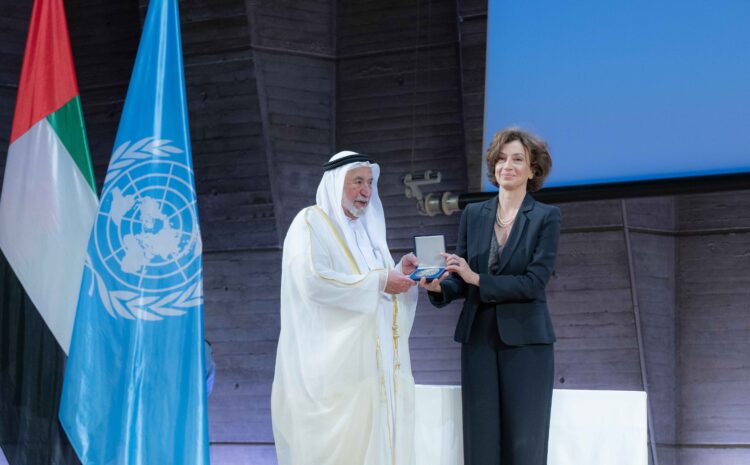
UNESCO honours Sharjah Ruler for Arabic historical dictionary
PARIS, 21st May, 2025 (WAM) — His Highness Sheikh Dr. Sultan bin Mohammed Al Qasimi, a Supreme Council Member and the Ruler of Sharjah, was awarded a distinguished UNESCO honour upon the completion of the Historical Dictionary of the Arabic Language.
At the official ceremony held at UNESCO’s headquarters in Paris, themed “Arabic Language: A Bridge Between Heritage and Knowledge”, H.H. Sheikha Jawaher bint Mohammed Al Qasimi, wife of His Highness the Ruler of Sharjah and Chairperson of the Supreme Council for Family Affairs (SCFA), was present, along with Sheikha Bodour bint Sultan Al Qasimi, chairperson of the Sharjah Book Authority (SBA).
Upon his arrival at UNESCO headquarters, His Highness was received and warmly welcomed by Audrey Azoulay, Director-General of UNESCO; Fahd Saeed Al Raqbani, UAE Ambassador to France; Abdullah bin Mohammed Al Owais, Chairman of Sharjah’s Department of Culture; Jamal Al-Turaifi, President of Al Qasimia University; Ahmed bin Rakkad Al Ameri, CEO of the Sharjah Book Authority; Ali Al-Haj Al Ali, UAE Permanent Delegate to UNESCO; and Mohamed Hassan Khalaf, Director General of the Sharjah Broadcasting Authority.
His Highness The Ruler of Sharjah delivered a speech during the ceremony, stating, “It is my honour to stand among you today in this esteemed cultural forum at UNESCO, whose noble mission we revere and whose fruitful partnership we cherish. Together, we commemorate a groundbreaking scholarly and cultural milestone—the Historical Dictionary of the Arabic Language. This occasion is further enriched by its coincidence with the World Day for Cultural Diversity for Dialogue and Development, a day designated by UNESCO to promote mutual understanding and respect among cultures, reinforcing our collective humanity.
“Language, in all its forms, undeniably serves as the main repository of culture and the most authentic reflection of a community’s identity. In celebrating the Historical Dictionary of the Arabic Language today, we honour a vital aspect of our rich human diversity, represented by the Arabic language, which carries a deep civilisational heritage and has had a significant scientific and humanistic impact.”
His Highness subsequently emphasised the contributions of the partner institutions that played a role in the creation of the dictionary, stating, “Sharjah, through its Arabic Language Academy and in collaboration with the Union of Arab Scientific and Language Academies in Cairo, along with linguistic academies, institutes, and institutions throughout the Arab world, succeeded in the completion of this dictionary in one hundred and twenty-seven volumes, as you see before you both in print and online.” I extend my heartfelt appreciation to the numerous researchers and proofreaders from diverse Arab nations whose remarkable dedication has made this accomplishment achievable.
“For centuries, Arabic has been a dynamic and enduring language, embodying the heritage of an entire civilisation and encompassing a multitude of fields of knowledge. It serves as the language of the Holy Qur’an, the means of communication for philosophers and scientists, and the artistic means for poets and intellectuals. Even now, it persists in accomplishing its mission throughout the domains of knowledge. But unlike other languages, no academic work has yet been done to show how its lexicon and meanings have changed over time. Thus, the Historical Dictionary of the Arabic Language originated as a vision, evolved into a project, and has now come to fruition—thanks to the collaboration of efforts, the amalgamation of expertise, and a steadfast dedication.”
His Highness emphasised that all languages possess an equal right to exist and evolve, stating, “When we restore to Arabic its rightful history and highlight the aspects of its development, we simultaneously affirm to the world that every language is entitled to existence, progress and celebration, and that cultural justice demands that humanity not be reduced to a single tongue, nor the civilisations of peoples confined to one model.” “Just as biodiversity ensures the continuity of life, cultural and linguistic diversity secures the ongoing evolution and revitalisation of human creativity.”
He then conveyed his sincere appreciation to UNESCO for recognising the Historical Dictionary of the Arabic Language and for the collaborative cultural initiatives between Sharjah and the organisation. “Our celebration of this work within UNESCO’s premises sends a clear message that culture transcends borders and that Arab endeavours, undertaken with sincerity and a collective spirit, receive global acknowledgement and acceptance. From this podium, I express my heartfelt gratitude to UNESCO and its member states for their strong belief in the significance of Arabic and for their collaborative efforts in various initiatives—most notably, the Sharjah–UNESCO Arab Culture Award, which represents our cultural alignment with this esteemed organisation and its members.”
He wrapped up with a call for unity, stating, “Let us move forward together, dear friends, hand in hand, to enhance our cultural dialogue, to protect our common human heritage, and to guarantee that every culture’s voice is acknowledged, every language valued, and every people stay true to their genuine identity.”
At the ceremony, Audrey Azoulay, the Director-General of UNESCO, presented a speech to welcome His Highness the Ruler of Sharjah. She expressed her pleasure regarding the visit of the Sharjah delegation to Paris, acknowledging the emirate as a worldwide centre of knowledge and culture.
Azoulay emphasised Sharjah’s significant investments in diverse areas that align with UNESCO’s mission, pointing out its achievement of multiple international cultural awards, including UNESCO’s recognition of Sharjah as a “World Book Capital” in 2019. This acknowledgement highlights Sharjah’s eternal commitment to literature, cultural heritage, the spread of knowledge, and cultural diversity.
Azoulay praised the foresight of His Highness Sheikh Dr. Sultan bin Mohammed Al Qasimi, which has placed culture and knowledge at the heart of Sharjah’s policies. She recognised the emirate’s arrangements for various cultural events, festivals, and exhibitions that span multiple areas of culture, arts, and history. These initiatives, such as the UNESCO–Sharjah Award for Arab Culture, promote intercultural dialogue and highlight the lasting collaboration between Sharjah and UNESCO that has continued for over 25 years.
She acknowledged Sharjah’s initiative in signing an agreement to digitise UNESCO’s archives, marking a significant step towards preserving the organisation’s vast collection of books and documents, some of which date back over 80 years. This initiative guarantees the protection of precious historical documents that detail various events, agreements, and initiatives.
Azoulay conveyed her appreciation for the successful completion of the Historical Dictionary of the Arabic Language, a significant accomplishment achieved under the guidance of His Highness the Ruler of Sharjah. Created by a multitude of researchers and editors from 20 linguistic institutions throughout the Arab world, this dictionary has earned recognition from the Guinness World Records as the largest historical dictionary, consisting of 127 volumes. It has been officially included in UNESCO’s library, offering educators, researchers, students, and Arabic language enthusiasts a thorough resource.
She highlighted the richness and value of the Arabic language, showcasing its adaptability over time and its importance to millions around the globe. Azoulay highlighted her investigation of the term “peace”, tracing it back to the triliteral root of the Arabic word mase, represented by the letters (س-ل-م), and noting its semantic similarities in different languages.
At the conclusion of the ceremony, His Highness the Ruler of Sharjah signed a copy of the Historical Dictionary of the Arabic Language and presented it as a gift to UNESCO.





